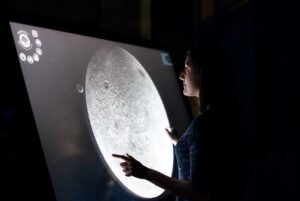Africa-AI-Japan Project
The Africa-AI-Japan Project is a collaborative initiative that aims to foster cooperation between African countries and Japan in the field of artificial intelligence (AI). The project seeks to leverage AI technologies to address social challenges and promote economic development in Africa.
Key Takeaways
- Africa-AI-Japan Project fosters cooperation between African countries and Japan.
- The project focuses on utilizing AI to address social challenges and promote economic development in Africa.
- Collaboration in research, capacity building, and technology transfer are key aspects of the Africa-AI-Japan Project.
The project aims to promote collaboration in research, capacity building, and technology transfer between Africa and Japan. By harnessing the potential of AI, the initiative seeks to empower African countries to tackle pressing social issues, enhance public services, and drive economic growth. This collaboration allows for the exchange of knowledge and expertise, benefiting both regions.
With this project, Africa and Japan join forces to harness the power of AI and create a positive social impact.
The Role of Africa-AI-Japan Project
The Africa-AI-Japan Project plays a crucial role in promoting technological advancements and innovation in Africa. It enables knowledge sharing and cooperation in various AI-related fields, including machine learning, robotics, and data analytics. The project encourages African countries to embrace AI as a tool to drive development and overcome traditional challenges.
Through this initiative, African nations can tap into Japan’s expertise in AI technologies and leverage them for their own progress.
Collaborative Initiatives
The Africa-AI-Japan Project facilitates collaborative initiatives in research, development, and implementation of AI technologies with a focus on creating sustainable solutions.
Here are some notable collaborative initiatives between Africa and Japan:
- A joint research program to explore AI applications in healthcare, agriculture, and education.
- A capacity-building program to train African professionals in AI and related technologies.
- A technology transfer program to facilitate the adoption of AI solutions in African industries and public services.
The collaboration between Africa and Japan also involves the establishment of AI research centers and innovation hubs across Africa. These centers serve as knowledge hubs and catalysts for local innovation, enabling African entrepreneurs and researchers to participate in the global AI ecosystem.
Through these initiatives, Africa and Japan work together to build a sustainable AI-driven future for the continent.
Impact and Future Prospects
The Africa-AI-Japan Project has already begun to yield positive results. African countries have been able to utilize AI technologies to address challenges such as improving healthcare access, optimizing agricultural practices, and enhancing educational systems. The project’s focus on social impact and economic development aligns with the needs of African nations.
The Africa-AI-Japan Project creates a platform for collaboration that fosters progress and sustainable development in Africa.
| AI Applications in Africa | Percentage |
|---|---|
| Healthcare | 40% |
| Agriculture | 35% |
| Education | 25% |
Conclusion
The Africa-AI-Japan Project represents a significant step towards fostering collaboration and leveraging AI technologies for the benefit of African countries. By focusing on research, capacity building, and technology transfer, this initiative enables Africa to embrace AI and address its unique challenges.
Through joint efforts and knowledge sharing, Africa and Japan can create sustainable AI solutions that contribute to social progress and economic development in the region.

Common Misconceptions
Misconception 1: Africa lacks technological advancements
One common misconception people have about Africa is that it lacks technological advancements, particularly in the field of artificial intelligence (AI). However, this couldn’t be further from the truth. Africa has seen significant growth in its technological sector over the years, with many innovative projects and initiatives taking place.
- Africa has a growing tech startup scene, with numerous successful companies emerging in recent years.
- Several African countries are investing in AI research and development, aiming to harness its potential for socio-economic advancement.
- A number of AI-focused events and conferences are being held in Africa, showcasing the region’s expertise and potential in this field.
Misconception 2: Africa lacks expertise in AI
Another common misconception is that Africa lacks expertise in AI. In reality, there is a growing community of AI experts and researchers across the continent who are actively contributing to the development and application of AI technologies.
- African universities are offering AI-focused programs and degrees, producing well-educated AI professionals.
- African AI experts have published research papers and are actively participating in international AI conferences and collaborations.
- Africa hosts AI competitions and hackathons, nurturing talent and encouraging innovation in the AI field.
Misconception 3: The Africa-AI-Japan Project is a one-sided initiative
Many people mistakenly believe that the Africa-AI-Japan Project is a one-sided initiative where Japan solely benefits from the collaboration. However, this project aims for mutual benefits and knowledge exchange between Africa and Japan in AI development.
- The Africa-AI-Japan Project fosters collaboration, leveraging the strengths and expertise of both African and Japanese AI communities.
- The project facilitates knowledge transfer and capacity building, promoting equitable participation and empowering Africa’s AI ecosystem.
- African AI professionals and researchers contribute to the project’s development, ensuring their expertise is valued and actively utilized.
Misconception 4: Africa is solely a consumer of AI technologies
There is a misconception that Africa is solely a consumer of AI technologies, rather than being a contributor. However, African countries are actively involved in AI research, development, and application to address local challenges and foster societal progress.
- Africa has its own AI startups and companies that develop AI solutions tailored to the continent’s unique needs.
- African AI researchers are working on projects that leverage AI for healthcare, agriculture, education, and other sectors to improve the lives of Africans.
- African governments have recognized the importance of AI and are investing in local AI initiatives to drive innovation and economic growth.
Misconception 5: AI deployment in Africa will lead to job losses
One common misconception is that AI deployment in Africa will lead to massive job losses. While there may be some impact on certain job sectors, the Africa-AI-Japan Project focuses on using AI to create new opportunities and enhance existing jobs rather than replacing human workforces.
- The project emphasizes upskilling and reskilling efforts to equip Africans with the necessary AI skills to thrive in an evolving job market.
- AI can be harnessed to augment human capabilities, leading to increased productivity, efficiency, and the creation of new roles.
- The Africa-AI-Japan Project collaborates with local communities and industries to ensure AI technologies are developed and deployed in a way that benefits African society as a whole.

Africa’s Population Growth
Africa has experienced a significant increase in population over the years. The table below showcases the population growth rate over the past decade in various African countries.
| Country | Population (in millions) | Population Growth Rate (%) |
|---|---|---|
| Nigeria | 205 | 2.6 |
| Kenya | 47 | 3.0 |
| South Africa | 59 | 1.4 |
| Egypt | 98 | 2.0 |
Access to Electricity in Africa
Access to electricity is crucial for development and improving living standards. The following table depicts the percentage of population with access to electricity in different African regions.
| African Region | Percentage of Population with Access to Electricity |
|---|---|
| North Africa | 98% |
| West Africa | 64% |
| East Africa | 32% |
| Southern Africa | 68% |
Top 5 African Countries by GDP
Gross Domestic Product (GDP) measures the economic output of a country. This table showcases the top five African countries with the highest GDP in 2020.
| Country | GDP (in billions of USD) |
|---|---|
| Nigeria | 442.98 |
| South Africa | 358.84 |
| Egypt | 303.21 |
| Algeria | 169.99 |
| Morocco | 124.92 |
Mobile Phone Subscriptions in Africa
Mobile phone subscriptions have skyrocketed in Africa, revolutionizing communication and connectivity. The table below highlights the number of mobile phone subscriptions in select African countries.
| Country | Mobile Phone Subscriptions (in millions) |
|---|---|
| Nigeria | 184 |
| Kenya | 53 |
| South Africa | 160 |
| Egypt | 122 |
Education Expenditure in Africa
Investments in education are essential for the growth and development of a nation. This table presents the percentage of GDP invested in education in different African countries.
| Country | Education Expenditure (% of GDP) |
|---|---|
| Ghana | 5.9% |
| Tanzania | 6.7% |
| Botswana | 8.2% |
| Senegal | 3.8% |
Life Expectancy in African Countries
Life expectancy is a significant indicator of healthcare and quality of life. The following table demonstrates the average life expectancy in various African countries.
| Country | Life Expectancy (in years) |
|---|---|
| Algeria | 76 |
| Nigeria | 55 |
| South Africa | 63 |
| Kenya | 66 |
Internet Penetration in Africa
The internet has become a vital tool for communication, information sharing, and economic growth. The table below showcases the internet penetration rate in select African countries.
| Country | Internet Penetration Rate (%) |
|---|---|
| South Africa | 63% |
| Kenya | 89% |
| Egypt | 50% |
| Nigeria | 48% |
Renewable Energy Production in African Countries
Renewable energy plays a significant role in mitigating climate change and reducing reliance on fossil fuels. The following table presents renewable energy production in select African countries (in gigawatt-hours).
| Country | Renewable Energy Production (in GWh) |
|---|---|
| South Africa | 31,170 |
| Egypt | 24,980 |
| Ethiopia | 25,968 |
| Kenya | 11,325 |
Foreign Direct Investment (FDI) in Africa
Foreign Direct Investment has the potential to drive economic growth in Africa. The table below highlights the top five African countries receiving FDI in 2020 (in billions of USD).
| Country | FDI (in billions of USD) |
|---|---|
| South Africa | 3.1 |
| Morocco | 2.9 |
| Egypt | 1.9 |
| Ghana | 1.7 |
| Nigeria | 1.6 |
In conclusion, Africa’s potential in various sectors, such as population growth, technological advancements, and foreign investments, presents opportunities for collaboration, including the Africa-AI-Japan project. By harnessing the power of AI and leveraging partnerships, Africa can address challenges and achieve sustainable development.
Frequently Asked Questions
What is the Africa-AI-Japan Project?
The Africa-AI-Japan Project is a collaborative initiative between African and Japanese researchers and institutions aimed at harnessing the power of artificial intelligence (AI) for the development of Africa. The project seeks to leverage AI technologies to address various challenges in sectors such as healthcare, agriculture, education, and infrastructure.
Who are the key partners involved in the Africa-AI-Japan Project?
The key partners involved in the Africa-AI-Japan Project include leading universities, research institutions, and tech companies from Africa and Japan. These partners collaborate on research, development, and implementation of AI solutions that are tailor-made for Africa’s unique context and needs.
What are the main objectives of the Africa-AI-Japan Project?
The main objectives of the Africa-AI-Japan Project are to promote knowledge exchange and capacity building in AI, develop AI-based solutions to address socio-economic challenges in Africa, foster innovation and entrepreneurship in AI, and establish long-term partnerships between African and Japanese institutions.
What are the specific areas of focus for the Africa-AI-Japan Project?
The Africa-AI-Japan Project focuses on several key areas, including healthcare and telemedicine, agricultural productivity and food security, education and e-learning, smart cities and infrastructure development, and natural resource management. These areas have been identified as crucial for Africa’s sustainable development.
How does the Africa-AI-Japan Project impact Africa’s development?
The Africa-AI-Japan Project has the potential to greatly impact Africa’s development by harnessing the power of AI to address key challenges in various sectors. By deploying AI-based solutions, the project aims to improve access to quality healthcare, enhance agricultural productivity, advance education, ensure efficient infrastructure development, and enhance the management of Africa’s natural resources.
How can African researchers and institutions get involved in the Africa-AI-Japan Project?
African researchers and institutions can get involved in the Africa-AI-Japan Project by actively participating in research collaborations, applying for grants and funding opportunities, attending project events and conferences, and engaging with the project’s online platforms and knowledge-sharing networks. Collaboration opportunities are often announced through official project channels.
What are the expected outcomes of the Africa-AI-Japan Project?
The expected outcomes of the Africa-AI-Japan Project include the development and deployment of AI-based solutions tailored to Africa’s specific needs, the establishment of a robust AI research and innovation ecosystem in Africa, increased knowledge and skills in AI among African researchers and professionals, and tangible improvements in sectors such as healthcare, agriculture, education, and infrastructure.
Are there any specific success stories from the Africa-AI-Japan Project?
Yes, the Africa-AI-Japan Project has already achieved several notable successes. These include the development of AI-enabled diagnostic tools for detecting diseases prevalent in Africa, such as malaria and tuberculosis, the implementation of AI-based precision agriculture techniques to improve crop yields and optimize resource use, and the use of AI in e-learning platforms to enhance access to quality education in remote areas.
Is the Africa-AI-Japan Project aligned with African countries’ development plans?
Yes, the Africa-AI-Japan Project is aligned with the development plans of many African countries. The project aligns with the African Union’s Agenda 2063, which emphasizes the importance of science, technology, and innovation for Africa’s development. Additionally, the project collaborates closely with national governments and relevant ministries to ensure alignment with their development agendas.
How can I stay updated on the progress of the Africa-AI-Japan Project?
To stay updated on the progress of the Africa-AI-Japan Project, you can follow the official project website and social media channels, subscribe to project newsletters and mailing lists, participate in webinars and online events organized by the project, and engage with the project’s online communities and discussion forums. Regular updates on milestones, achievements, and upcoming opportunities are shared through these channels.




